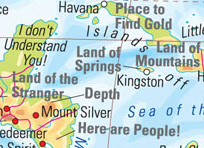The American compound rise?
Yesterday, in answering a question from a reader, I glanced over the section on intonation in the 1877 edition of Henry Sweet's "A Handbook of Phonetics". I found what I was looking for, namely the section where Sweet distinguishes three "primary 'forms' or 'inflections' of tones" in the intonation of English — level, rising, and falling — and the "compound tones" such as "compound rising" (= fall+rise) and "compound falling" (= rise+fall).
But next came something surprising:
280. The use of tone varies greatly in different languages. In English the tones express various logical and emotional modifications, such as surprise, uncertainty, &c. In some languages there is a tendency to employ one predominant tone without much regard to its meaning. Thus in Scotch the rising tone is often employed monotonously, not only in questions but also in answers and statements of facts. In Glasgow Scotch the falling tone predominates. In American English the compound rise is the characteristic tone. [emphasis added]
Read the rest of this entry »


